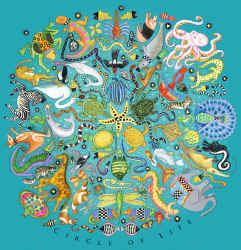1) Jack breaks the code of the Hokey Pokey world by exposing the falseness of the children's imagination. The Destroyer walks around carelessly aiming his "clicker," an old remote, at children throughout Hokey Pokey. His empowered stride lays children to waste after three clicks. One-two-three means KABOOM and your body has now been blown to smithereens in everyone's imagination. The girl, I believe, he admires has a little brother that was an innocent victim to the Destroyers clicky rampage. Jack changes from being the macho older kid that doesn't have time for anyone else but his amigos (and rescuing his bike) to being this little boy's hero. Jack finds the boy screaming in terror from his body "exploding." Jack breaks him out of this notion by showing him that its all fake...its just everything's emotion.
The care, patience, and authority Jack brings to the situation is such a salient moment because I read a more serene, empathetic character that spent the majority of the text in egocentricity. It was wonderful reading his character change. He takes the clicker from the Destroyer's hand and starts to rapidly click away in his face. Nothing happens! Imaginary world tested.
2) When Jack rips the yellow ribbon from the girl's hair, I couldn't stop laughing. I thought that was the most absurd and unexpected response in the situation. She was yelling at him and making fun of him and instead of retaliating with force, he just took a piece of her. Also, the yellow ribbon is symbolic of their subconscious love for each other and connectedness.
3) The end of the story repeats the introduction but when read at the end, it made sense. Hokey Pokey is a real, but imaginary world where anything can happen. Its a huge party with different characters finding peace and joy in being together. I started to hate this read when I first opened the book, I grew to appreciate the story and its meaning. Its a book that I would share with 5th, 6th, 7th graders. It talks about the gradual release of childhood.



No comments:
Post a Comment